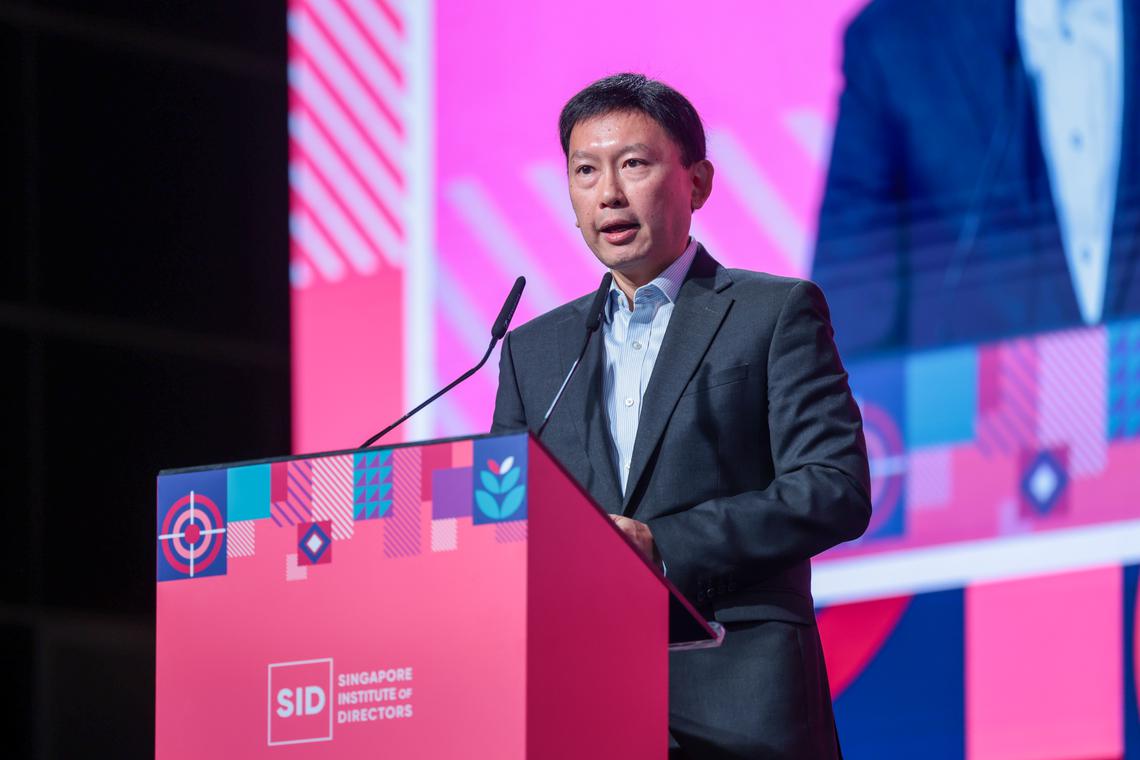SINGAPORE – Singapore-listed companies will be encouraged to share their plans with investors, including views on their outlook and prospects, said Monetary Authority of Singapore (MAS) deputy chairman Chee Hong Tat.
While this is commonly done in overseas markets, he noted that there may be genuine concerns about potential legal exposure when companies here provide such information.
Mr Chee, speaking at a Singapore Institute of Directors (SID) conference on Sept 12, said: “MAS will review how to provide greater clarity on our regulatory framework, to facilitate open communication while upholding market integrity.
“We hope this will give companies greater comfort and assurance to have meaningful forward-looking engagements with your investors.”
This is a key focus of a “Value Unlock” package by the MAS-led Equities Market Review Group aimed at helping companies build capabilities, improve investor communications and foster collaborative networks.
“Just as durian lovers today are highly discerning – able to tell the difference between a D24, Mao Shan Wang or a Black Gold – investors too are looking beyond headline earnings,” Mr Chee, who is also Minister for National Development, told the audience at Suntec Singapore Convention and Exhibition Centre.
“When companies combine strategic value creation with effective communication, they create the conditions for investor confidence – this in turn translates into investment dollars, which drives better share price performance and creates greater shareholder value.”
Mr Chee said companies should fine-tune and communicate their strategic plans, hold regular investor engagements and make their growth story “accessible”.
He said the sharing of views on a company’s outlook and prospects demonstrates the management’s confidence in delivering strategic objectives and makes the company’s trajectory more visible to investors, he said.
Mr Chee added that the Singapore Exchange (SGX) is reviewing how companies can do more to disclose policies on dividends and investor relations, as these would help investors understand a company’s capital management approach, engagement practices and how the management will deliver shareholder value.
“SGX will hold investor roadshows or trade fairs which companies can participate in, to gain exposure to institutional and retail investors,” he said, adding that the bourse may also arrange for media features and engagements designed to help profile listed companies that have a good story to share with the investing community.
On building capabilities, Mr Chee said company leaders need skills beyond financial management, including corporate strategy, capital optimisation, investor engagement and media outreach.
They must develop long-term plans and think about value creation with shareholders in mind, he said, adding that this often requires a “mindset shift”, including for founder chief executives who have been growing the business from the beginning, as leading a public company is different from helming a private company.
“For listed companies, the IPO is not the destination, but a gateway to raising further capital, business growth and long-term shareholder returns,” he said, referring to initial public offerings.
“Shareholder value must therefore be a priority – company management and boards must look for ways to deliver shareholder value, including through business expansion, capital optimisation and operational transformation.”
To support the development of these skills, MAS is looking to fund companies’ training investments, with more details to be announced in due course, said Mr Chee.
On fostering collaborative networks, he said that SID will launch a new Chairpersons Guild in November, which will bring together the board chairs of listed companies to build a “micro community” for learning and mutual support.
SID will work with organisations like UBS and McKinsey to offer expert insights on strategies to unlock shareholder value, and bring in experienced board chairs from global markets to share their experiences.
Mr Chee also noted that a key part of building communities is spotlighting companies, adding that indexes help create visibility and track the performance of different industry and market segments.
SGX will thus be launching a new index that tracks companies beyond the Straits Times Index (STI), as part of its efforts to showcase the Republic’s broader equity market, he said.
“The STI represents only a portion of our listed companies, and investor interest in the next tier is growing… This new index will provide a useful lens to track how the next tier of large and liquid companies are evolving – whether through business model transformation, improved governance or stronger capital management initiatives,” said Mr Chee.
“Over time, we hope to see more indices emerge, covering areas such as corporate governance and sustainability – creating a virtuous circle and generating positive momentum for the entire market.”
Mr Chee said Singapore’s equities market has shown resilience in recent months, and there are encouraging signs of renewed interest from both retail and institutional investors, signalling a “healthy appetite” for local equities.
He also noted that the Republic’s financial sector has been creating many good jobs for local workers, with more than 2,500 licensed financial institutions employing close to 200,000 people, of which over 80 per cent are local employees.
The sector also offers the highest median gross income among full-time local employees.
Mr Chee said that over the past decade, the financial sector workforce grew by more than 40,000, with nine out of 10 of the net jobs created going to local workers.
The financial and insurance services sector also continues to offer about 6,500 job opportunities in roles such as those of financial planners and wealth managers.
Mr Chee said: “The opportunities before us are substantial… Singapore’s strategic position, our position as a trusted hub, our regulatory framework and the quality of our people and our corporate leadership – these provide the foundations for helping our companies to unlock shareholder value.”
The SID directors’ conference, themed Transformational Leadership: Purpose, Practice, Performance, Progress, focused on the evolving role of company directors and the need for boards to drive value creation. More than 800 industry leaders, directors and decision makers attended the event.


